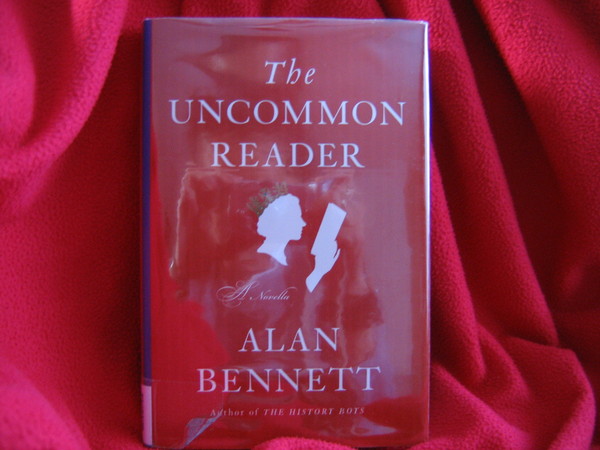close

某日,英國女皇意外地遇上皇宮裡的流動圖書車。借本書看的隨意之舉讓她發現閱讀的樂趣,從此手必一卷欲罷不能。
以閱讀為嗜好,多數人自然會以為這是件好事,至少無傷大雅,不壞大事。但一國之尊有了偏好,甚至沉耽於興趣中,宛如寧靜的水池擲了塊小石子,為行止如儀的皇宮裡引起了小小激盪。這激盪隨著女皇的各式活動,又如朵朵漣漪般向皇宮以外的世界蕩漾出去。
No. Hobbies involved preferences and preferences had to be avoided; preferences excluded people. One had no preferences. Her job was to take an interest, no to be interested herself. And besides, reading wasn’t doing. She was doer. (pg. 6)
藉由本書,隨著女皇發現閱讀的樂趣,思考閱讀為何吸引她,將自己的生活經驗與閱讀聯結,從讀者、筆記紀錄者、漸漸轉為作者,進一步反省審思自己的生命,我也思考探討自己的閱讀動機以及閱讀的吸引力。一本書看下來,是有些明白和收穫。
我覺得有趣的,書中也提到的是,女皇的閱歷豐富,書中虛幻世界還能吸引她嗎?既已生活在皇宮裡,何須書中的黃金屋呢?
因為書對讀者是一視同仁,沒有分別心的。在書中,王官貴族和販夫走卒都是隱姓埋名的讀者,是地位平等的讀者。書中世界,對於出生即顯赫的女皇而言,是個可以安然沉默地觀察社會百態,體會人生驚奇的美麗新世界。
Few people, after all, had seen more of the world than she had. There was scarcely a country she had not visited, a notability she had not met. Herself part of the panoply of the world, why now was she intrigued by books, which whatever else they might be, were just a reflection of the world or a version of it? Books? She had seen the real thing.
‘I read, I think,’ she said to Norman, ‘because one has a duty to find out what people are like,’ a trite enough remark of which Norman took not much notice, feeling himself under no such obligation and reading purely for pleasure, not enlightenment, though part of the pleasure was the enlightenment, he could see that. But duty did not come into it.
To someone with the background of the Queen, though, pleasure had always taken second place to duty. If she could feel she had a duty to read then she could set about it with a clear conscience, with the pleasure, if pleasure there was, incidental. But why did it take possession of her now? This she did not discuss with Norman, as she felt it had to do with who she was and the position she occupied.
The appeal of reading, she thought, lay in its indifference: there was something undeferring about literature. Books did not care who was reading them or whether one read them or not. All readers were equal, herself included. Literature, she thought, is a commonwealth; letters a republic. Actually, she had heard this phrase, the republic of letters, used before, at graduation ceremonies, honorary degrees and the like, though without knowing quite what it meant. At that time talk of a republic of any sort she had thought mildly insulting and in her actual presence tactless, to say the least. It was only now she understood what it meant. Books did not defer. All readers were equal, and this took her back to the beginning of her life. As a girl, one of here greatest thrills had been on VE night when she and her sister had slipped out of the gates and mingled unrecognized with the crowds. There was something of that, she felt, to reading. It was anonymous; it was common. And she who had led a life apart now found that she craved it. Here in these pages and between these covers she could go unrecognized. (pg. 29-31)
其他我覺得有意思的文字。
She switched the light on again and reached for her notebook and wrote: ‘You don’t put your life into your books. You find it there.’ (pg.100-101)
不是在你的書中記下你的生命,而是在書中找到你的生命。
What she was finding also was how one book led to another, doors kept opening wherever she turned and the days weren’t long enough for the reading she wanted to do. (pg. 21)
共同的感嘆:一本書帶出另一本書,永遠沒有時間看完想看的書。
‘Of course,’ said the Queen,’ but briefing is not reading. In fact it is the antithesis of reading. Briefing is terse, factual and to the point. Reading is untidy, discursive and perpetually inviting. Briefing closes down a subject, reading opens it up.’ (pg. 21-22 on Briefing)
對簡報或是文摘的看法。很對。
She found, though, that when she had written something down, even if it was just an entry in her notebook, she was happy as once she would have been happy after doing some reading. And it came to her again that she did not want simply to be a reader. A reader was next door to being a spectator, whereas when she was writing she was doing, and doing was her duty. (pg.101-102)
讀者僅次於旁觀者,寫作讓她覺淂有成就感。雖然「讀者僅次於旁觀者」也對,但好的讀者,能藉由文字了解作者的讀者,能藉由故事而經歷故事的讀者,我以為也和作者差不多了。
…But then books, as I’m sure you know, seldom prompt a course of action. Books generally just confirm you in what you have, perhaps unwittingly, decided to do already. You go to a book to have your convictions corroborated. A book, as it were, closes the book.’ (pg. 114 A book closes the book.)
在書中找已經預設知道的答案。
全站熱搜


 留言列表
留言列表